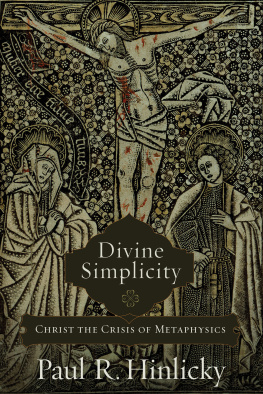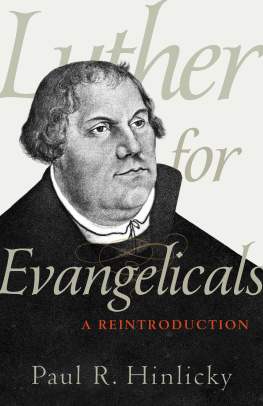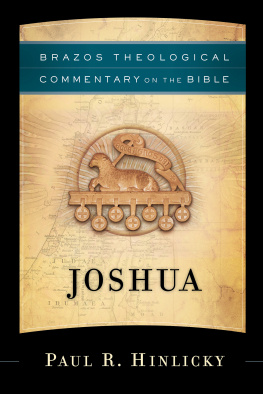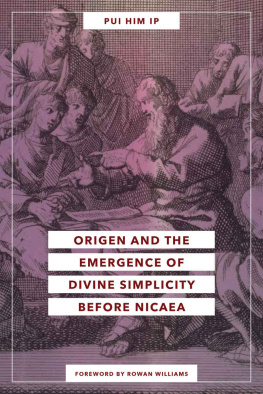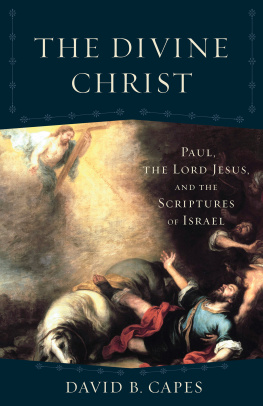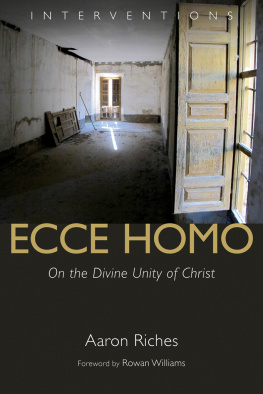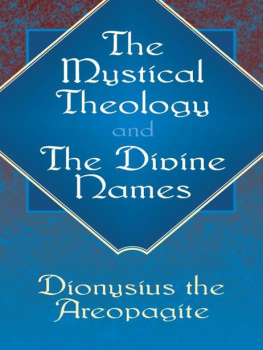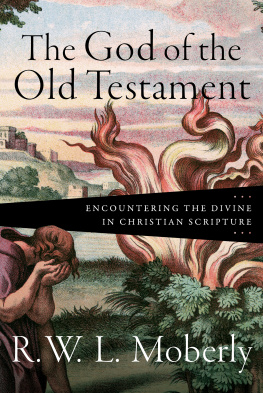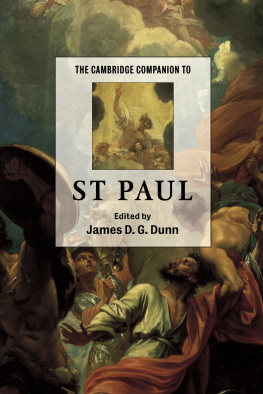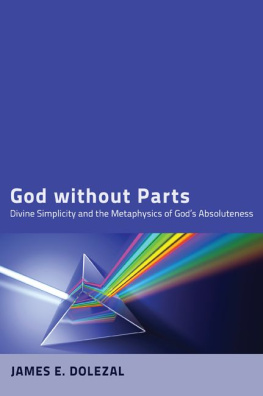Paul R. Hinlicky - Divine Simplicity: Christ the Crisis of Metaphysics
Here you can read online Paul R. Hinlicky - Divine Simplicity: Christ the Crisis of Metaphysics full text of the book (entire story) in english for free. Download pdf and epub, get meaning, cover and reviews about this ebook. year: 2016, publisher: Baker Publishing Group, genre: Religion. Description of the work, (preface) as well as reviews are available. Best literature library LitArk.com created for fans of good reading and offers a wide selection of genres:
Romance novel
Science fiction
Adventure
Detective
Science
History
Home and family
Prose
Art
Politics
Computer
Non-fiction
Religion
Business
Children
Humor
Choose a favorite category and find really read worthwhile books. Enjoy immersion in the world of imagination, feel the emotions of the characters or learn something new for yourself, make an fascinating discovery.
- Book:Divine Simplicity: Christ the Crisis of Metaphysics
- Author:
- Publisher:Baker Publishing Group
- Genre:
- Year:2016
- Rating:5 / 5
- Favourites:Add to favourites
- Your mark:
- 100
- 1
- 2
- 3
- 4
- 5
Divine Simplicity: Christ the Crisis of Metaphysics: summary, description and annotation
We offer to read an annotation, description, summary or preface (depends on what the author of the book "Divine Simplicity: Christ the Crisis of Metaphysics" wrote himself). If you haven't found the necessary information about the book — write in the comments, we will try to find it.
Divine Simplicity: Christ the Crisis of Metaphysics — read online for free the complete book (whole text) full work
Below is the text of the book, divided by pages. System saving the place of the last page read, allows you to conveniently read the book "Divine Simplicity: Christ the Crisis of Metaphysics" online for free, without having to search again every time where you left off. Put a bookmark, and you can go to the page where you finished reading at any time.
Font size:
Interval:
Bookmark:
2016 by Paul R. Hinlicky
Published by Baker Academic
a division of Baker Publishing Group
P.O. Box 6287, Grand Rapids, MI 49516-6287
www.bakeracademic.com
Ebook edition created 2016
All rights reserved. No part of this publication may be reproduced, stored in a retrieval system, or transmitted in any form or by any meansfor example, electronic, photocopy, recordingwithout the prior written permission of the publisher. The only exception is brief quotations in printed reviews.
Library of Congress Cataloging-in-Publication Data is on file at the Library of Congress, Washington, DC.
ISBN 978-1-4934-0274-8
Unless noted otherwise, Scripture quotations are from the New Revised Standard Version of the Bible, copyright 1989, by the Division of Christian Education of the National Council of the Churches of Christ in the United States of America. Used by permission. All rights reserved.
Scripture translations labeled AT are those of the author.
Scripture quotations labeled KJV are from the King James Version of the Bible.
Scripture quotations labeled NIV are from the Holy Bible, New International Version. NIV. Copyright 1973, 1978, 1984, 2011 by Biblica, Inc. Used by permission of Zondervan. All rights reserved worldwide. www.zondervan.com
In thanksgiving for sixteen years (19992015)
in the studia humanitatis
with the students, faculty, staff,
administration, and board
of Roanoke College of Salem, Virginia
Cover
Title Page
Copyright Page
Dedication
Preface
Introduction
1. The Simplicity of Consistent Perichoresis
Auseinandersetzung
Are Divine Attributes Projections?
Not a Possible Perfection of the God of the Gospel
The Rgnon Thesis
2. The Unstable Synthesis of St. Thomas Aquinas
Ground Clearing
Thomass Theology of Divine Nature
The Patrological Alternative
The Trajectory of Protological Simplicity
Excursus: True Gnosis in Clement of Alexandria
Sitz im Leben
The True Gnostic
The Defense of Philosophy as Handmaiden to Theology
Christian Platonism
The Difficulty of Evaluating Clement
Evangelization of Hellenism
Clarity on a Collapsing Synthesis
How Augustine Stumbled (cf. 1 Cor. 1:23) over the Folly of God
The Diversity of Simplicities
In Defense of Augustine
The Radicality of Protological Simplicity
The Personal Union
Christological Apophaticism: The Coincidence of Opposites in Christ Crucified
4. Analogy and the Communicatio Idiomatum
Analogia Entis ?
Vindicating Univocity
Sorting Out Paradox and Similitude
Jesus as Vestige of the Trinity
The Analogy of Faith as Union with Christ
At the Mercy of the Spirit
Conclusion: And Christ Must Reign until... (1 Cor. 15:25)
The Counterthesis of Analytic Theology
The Rule Theory of Doctrine
The Decalogues First Table as the Rule of Weak Simplicity
Glossary of Foreign Words and Phrases
Works Cited
Index
Back Cover
I first conceived of this book during a decade-long intensive study of Islamic thought following the horrific events of September 11, 2001. My initial hunch was that the Aristotelian version of the doctrine of simplicity, thought thinking itself, taken up by St. Thomas Aquinas owed muchperhaps too muchto the Muslim philosopher Avicenna, who had Neoplatonized Aristotle with a notion of deity as thought thinking and willing itself. This amplification, also known to Augustine, provided dynamism to the notion of the simple deity expressed by emanation to form the great chain of being in the cosmic system. The Christian revision that Thomas accomplished demarcated the Creators act of being as pure actuality in strong ontological distinction from the creatures imperfect actualization, and in this way supposedly blocked emanation and replaced it with repetition by way of analogy. I was further thinking that, liberated from Thomass Christian revision, strong simplicity, by virtue of the power of the negative, progressively outstripped attempts to tame it for Christian purposes until it reappeared in pristine beauty in Spinozas doctrine of an eternal world viewed in the alternate modes of natura naturans and natura naturata . To a degree, these hunches are still at work in the book laid before you now, but no longer are they the matter of central importance as I had originally conceived.
What intervened and now runs like a red thread through this book is the discovery, via St. Augustines difficulty with it, of Paul the apostles ruminations on the oneness of God in his First Letter to the Corinthians. Paul begins with the word of the cross that delivers Christ as the paradoxical power and wisdom of God in 1 Corinthians 1:24; centers the letter in the prototrinitarian confession of 8:6; and culminates it in the doxological theopanism of 15:28. This too is a doctrine of divine simplicity, but in an eschatological rather than protological key and so in an ontologically weaker sense than the tradition that originates with the pre-Socratics, passes through Plato and Aristotle, and achieves its sublime expression among the ancients in Plotinus.
All this is here acknowledged as a brief preface and by way of expressing thanks to Baker Academic and my editor there, R. David Nelson, for their patience as the extended process of investigation produced a book somewhat different than originally proposed. I am also indebted to a veritable stable of theological stallions who in the interim have lent me their aid, reading and commenting on all or parts of this book, beginning with the aforementioned R. David Nelson. So I would also like to acknowledge with gratitude Rob Saler, David Bruner, the lateand saintedStephen Webb, Piotr Maysz, Derek Nelson, Jacob Goodson, Dennis Bielfeldt, and Hans Zorn for their interest, comment, and criticism as the draft evolved.
I think it was Stanley Hauerwas whom I once heard say that his method in theology was to read a lot of books, think hard, and then write his own book. Whether or not Stanley deserves credit for that bon mot, I have made it my own. As it seems to me, it is more important to converse than to monologue, to intervene in a conversation with a timely truth than to silence conversation by pretending to deliver a timeless one. I mention this here by way of justifying a definite selectivity in the authors and treatments of the topic engaged in this book. This selectivity is, among other things, a way of recommending said literature to the reader for fuller understanding. Yet the principle of selection is that these are the works that I have thus far found significant and so worth discussing in public, not to end debate but ecumenically to advance it. Usually, then, as I am giving an account of an author, unless and until explicitly noted otherwise, I should be understood as appropriating that authors line of thought into my own argument, striving to recognize truth even in positions that I will ultimately find inadequate. The proof of this dialogical method is in the pudding, then, whether the book succeeds according to its idiosyncratic way in advancing the argument about what it means for Christians to affirm of the Three of the gospel narrative that they are the one true God. Naturally, success is for the reader to judge.
I intend gender inclusivity, but not gender eliminationism, with respect to our common humanity by the strategy in English of alternating the nonspecific third-person personal pronouns between he and she and him and her. With respect to the divine, I defer to the primary language of faith in the Scriptures and the ecclesiastical terminology based on it that is useful for articulating the strong trinitarian personalism presupposed in this book. My intention throughout is hardly to idolize the masculine gender but rather to signal a specialized usage in theology for the God who is the Father of the Son in the Holy Spirit by capitalizing Him or His when the third-person singular pronoun is used in reference to the trinitarian persons. The divine nature, being nothing but a conceptual abstraction from the Three who are the Beloved Community, could be referred to in the neuter gender, as an It. But such an alienating innovation makes too much of a pseudoproblem that in material fact is under suspicion in the pages that follow.
Font size:
Interval:
Bookmark:
Similar books «Divine Simplicity: Christ the Crisis of Metaphysics»
Look at similar books to Divine Simplicity: Christ the Crisis of Metaphysics. We have selected literature similar in name and meaning in the hope of providing readers with more options to find new, interesting, not yet read works.
Discussion, reviews of the book Divine Simplicity: Christ the Crisis of Metaphysics and just readers' own opinions. Leave your comments, write what you think about the work, its meaning or the main characters. Specify what exactly you liked and what you didn't like, and why you think so.

